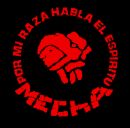|
ABOUT US:

Movimiento Estudiantil Chicano de Aztlán (MEChA) is a student organization
that promotes higher education, cultura, and historia. MEChA was founded on the principles of self-determination for the liberation
of our people. We believe that political involvement and education is the avenue for change in our society.
Each word in MEChA symbolizes a great concept in terms of la causa.
Movimiento means that the organization is dedicated to the movement to gain self-determination for our people. Estudiantil,
identifies the organization as a student group for we are part of our Raza's future. At the heart of the name is the use of
the identity: Chicano. At first seen as a negative word, now taken for a badge of honor. In adopting their new identity, the
students committed themselves to return to the barrios, colonias, or campos and together, struggle against the forces that
oppress our gente. Lastly, the affirmation that we are Indigenous people to this land by placing our movement in Aztlan, the
homeland of all peoples from Anahuak.
On campuses across Aztlan, MEChA and Mechistas are often the only
groups on campus Raza and non-Raza alike that seek to open the doors of higher education para nuestras comunidades and strive
for a society free of imperialism, racism, sexism, and homophobia. An inspirational statement in El Plan Santa Barbara that
speaks to this notes:
"MEChA must bring to the mind of every young Chicana and
Chicano that the liberation of her/his people from prejudice and oppression is in her/his hands and this responsibility is
greater than personal achievement and more meaningful than degrees, especially if they are earned at the expense of her/his
identity and cultural integrity. MEChA, then, is more than a name; it is a spirit of unity, of sisterhood and brotherhood,
and a resolve to undertake a struggle for liberation in society where justice is but a word. MEChA is a means to an end" (El
Plan de Santa Barbara).
HISTORICAL FOUNDATION

In March of 1969, at Denver, Colorado the Crusade for Justice organized the first
National Chicano Youth Liberation Conference that drafted the basic premises for the Chicana/Chicano Movement in El Plan de
Aztlán.
The following month, in April of 1969, over 100 Chicanas/Chicanos came together
at University of California, Santa Barbara to formulate a plan for higher education: El Plan de Santa Barbara. With this document
they were successful in the development of two very important contributions to the Chicano Movement: Movimiento Estudiantil
Chicano de Aztlán (MEChA) and Chicano Studies.
The adoption of the name Movimiento Estudiantil Chicano de Aztlan signaled a new
level of political consciousness among student activists. It was the final stage in the transformation of what had been loosely
organized, local student groups, into a single structure and a unified student movement.
Adamant rejection of the label "Mexican-American" meant rejection of the assimilation
and accommodationist melting pot ideology that had guided earlier generations of activists. Chicanismo involves a crucial
distinction in a political consciousness between a Mexican-American (Hispanic) and a Chicana/o mentality. El Plan de Santa
Barbara speaks to such issues of identity politics by asserting:
"The Mexican-American (Hispanic) is a person who lacks respect for
his/her cultural and ethnic heritage. Unsure of her/himself, she/he seeks assimilation as a way out of her/his "degraded"
social status. Consequently, she/he remains politically ineffective. In contrast, Chicanismo reflects self-respect and pride
on one's ethnic and cultural background. Thus, the Chicana/o acts with confidence and with a range of alternatives in the
political world. She/he is capable of developing an effective ideology through action" (El Plan de Santa Barbara).
MEChA played an important role in the creation and implementation of Chicana/o
Studies and support services programs on campus. Chicana/o Studies programs would be a relevant alternative to established
curricula. Most important, the Chicana/o Studies program would be the foundation of MEChA's political power base. Today many
Chicana/os Studies Programs would have difficulty operating if it were not for the enthusiasm and dedication of Mechistas
to Chicana/o Studies.
|

